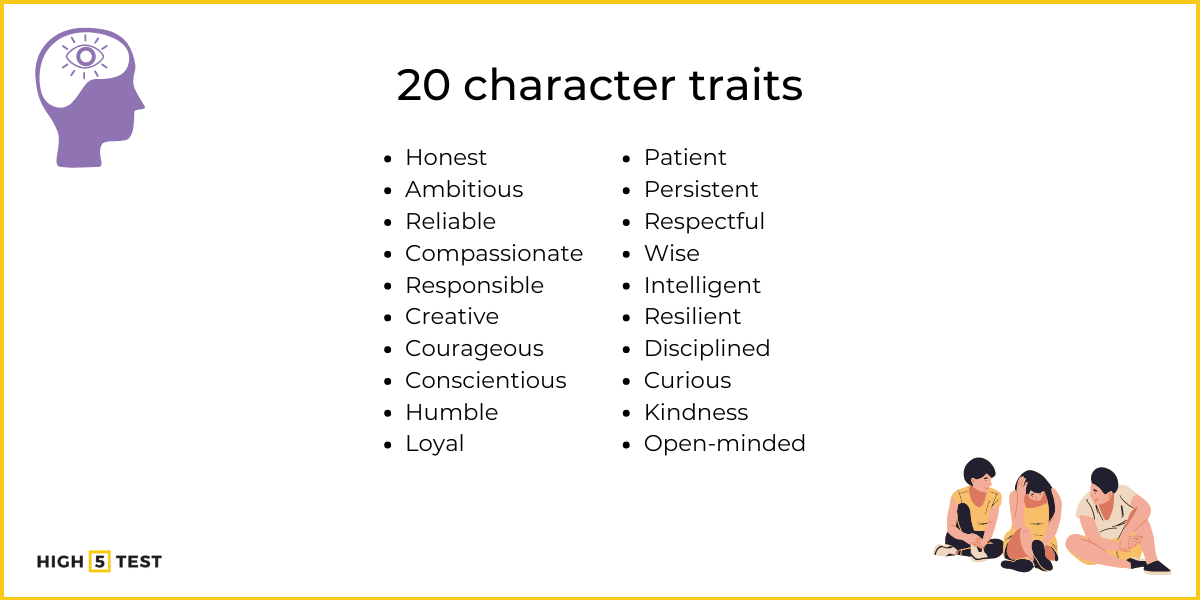Identifying and cultivating your innate strengths can be a powerful guide to becoming a better person aligned with your character traits and core values. The HIGH5 strengths assessment provides personalized insights into your unique character strengths – the positive qualities that energize you and allow you to perform at your best. With this self-awareness, you can intentionally lean into and develop the traits that will help you live with more integrity, empathy and positive impact in today’s world. Most people don’t realize just how much their character traits affect every aspect of their life – from health to career success.
We’re going to dive deep into the different types of character traits so that you’ll understand what makes a good person great and a bad one terrible. By understanding the different types of character traits, and knowing which ones define your core values, beliefs, morals, and more, you will be able to take control over your actions instead of being controlled by them – allowing for better decision-making skills and happier relationships with others around you. Let’s get right into it.
Top 20 character traits
Most people when they think about good character traits, often describe them as positive, brave, and trustworthy. The HIGH5 test is a valuable tool for individuals looking to understand their strengths and apply this knowledge across various aspects of their lives, including career and personal development.
Here’s a concise list of the best key characteristics aka character traits, which could be similar to strengths or qualities that the HIGH5 test can help identify:
- Honest
- Ambitious
- Reliable
- Compassionate
- Responsible
- Creative
- Courageous
- Conscientious
- Humble
- Loyal
- Patient
- Persistent
- Respectful
- Wise
- Intelligent
- Resilient
- Disciplined
- Curious
- Kindness
- Open-minded

Honest
Honesty is the foundation of integrity, encouraging transparency and trust in all interactions. Honest people consistently tell the truth and maintain solid moral principles, making them reliable and trustworthy in personal and professional relationships.
Ambitious
Ambition drives individuals to pursue goals with enthusiasm and determination. Ambitious people are often visionaries, setting high standards and striving to achieve great success, propelling them forward in their careers and personal lives.
Reliable
Reliability is characterized by consistency in actions and dependability in commitments. Reliable individuals are trusted to follow through on tasks and are often seen as stable pillars in their personal and professional circles.
Compassionate
Compassion involves empathy and a deep understanding of others’ feelings and situations, leading to supportive and caring actions. Compassionate people tend to be considerate, kind, and motivated by a desire to help others.
Responsible
Responsibility entails acting independently while considering the consequences of one’s actions on others. Responsible individuals are dependable, make thoughtful decisions, and are trusted to take charge of tasks and roles.
Creative
Creativity is marked by thinking outside the box and generating innovative ideas. Creative people often approach problems and situations with a fresh perspective, leading to unique solutions and artistic expressions.
Courageous
Courage involves taking risks and facing fears to achieve one’s goals. Courageous individuals are bold and resilient, often stepping up to challenges where others might hesitate.
Conscientious
Conscientiousness is the trait of being careful, diligent, and thorough. Conscientious people are organized, thoughtful, and mindful of details, making them effective in planning and execution.
Humble
Humility involves maintaining a modest view of one’s importance. Humble individuals do not seek excessive attention or take undue credit and are open to feedback and learning opportunities.
Loyal
Loyalty is a steadfast allegiance or fidelity to a cause or individuals, often beyond the call of duty. Loyal people are committed and reliable, providing vital support and consistency.
Patient
Patience is the ability to endure difficult circumstances calmly or to remain tolerant and understanding over time. Patient individuals can handle delays or problems without becoming annoyed or anxious.
Persistent
Persistence is the quality of continuing steadily despite problems or difficulties. Persistent individuals are determined and keep going forward in pursuit of their goals despite obstacles.
Respectful
Respect involves admiring someone for their abilities, qualities, or achievements and treating others with dignity and consideration. Respectful individuals value others’ opinions and maintain decorum in interactions.
Wise
Wisdom is using knowledge and experience to make sound judgments and decisions. Wise individuals are often sought for advice and are known for their insightful perspectives.
Intelligent
Intelligence refers to the ability to acquire and apply knowledge and skills. Intelligent people are often quick learners, able to reason and solve problems effectively.
Resilient
Resilience is the capacity to recover quickly from difficulties; it’s toughness. Resilient individuals bounce back from setbacks and use challenges as growth opportunities.
Disciplined
Discipline involves self-control and the ability to pursue what one thinks is right despite temptations to abandon it. Disciplined people are controlled and self-regulated, excelling personally and professionally.
Curious
Curiosity drives the desire to learn or know about anything; it is the thirst for exploration. Curious individuals are always seeking new information, experiences, and understanding.
Kindness
Kindness is the quality of being friendly, generous, and considerate. Kind people are often empathetic and act in ways that benefit others, enhancing their well-being.
Open-minded
Open-mindedness is the willingness to consider new ideas and perspectives without prejudice. Open-minded individuals are adaptable and receptive to change, making them valuable collaborators in diverse environments.
What are character traits?
Character traits are the individual traits, attributes, or qualities that construct a person’s character. It is a common belief that character traits can be inherited, but this does not make it true for everyone.
The idea that genetics affects someone’s personality is something you will hear about often in psychology and sociology classes. Some examples of character traits are honesty, loyalty, generosity, and impatience.
These are just some of the many different types of character traits that may help you to better understand yourself or others around you.
Types of character traits
Character traits come in various forms, shaping how we perceive individuals and how they interact with the world. These traits are often categorized into emotional, personality, physical, and value-based groups, each contributing uniquely to a person’s overall character.
Emotional character traits
Emotional character traits describe a person’s emotional responses and ability to manage feelings. Traits like empathy, resilience, and patience fall into this category. Those with solid emotional traits often handle stressful situations well and excel in social interactions.
Examples of emotional traits are moodiness, impulsivity, or patience.
Personality character traits
Personality character traits are the core attributes influencing how individuals behave, think, and feel. Personality traits play a significant role in shaping personal and professional relationships.
Examples of personality traits are curiosity, open-mindedness, and intelligence.
Physical character traits
Physical character traits relate to one’s observable physical attributes or actions. Gracefulness, strength, and agility are examples. While not as profoundly defining as emotional or personality traits, physical traits can impact self-esteem and how others perceive physical capabilities.
Examples of physical traits are height, weight, hair color, or eye color.
Values, beliefs, and morals as character traits
Values, beliefs, and morals comprise a critical category that reflects deep-seated principles guiding individuals’ actions and decisions.
Examples of values and morals are honesty, integrity, and kindness.
They are pivotal in developing trust and forming lasting relationships. These traits underscore an individual’s character in social and professional settings, dictating how they interact with the world and the legacies they leave behind.
Character traits vs. personality traits
The distinction between character and personality traits is nuanced yet crucial for understanding human behavior. Character traits are rooted in an individual’s ethical values and moral choices, reflecting their integrity and altruism in various situations. Societal standards often judge them and are indicative of how an individual relates to the moral fabric of their community. Conversely, personality traits are the inherent patterns of thoughts, feelings, and behaviors that make an individual unique. These traits are consistent across different situations and are less influenced by moral judgments.
Character traits encompass an ethical dimension, focusing on virtues like honesty, responsibility, and compassion. These traits are observable through an individual’s actions in morally relevant situations. For example, a person demonstrating integrity by owning up to a mistake or showing empathy toward someone’s distress illustrates how character traits manifest in real-world actions. Character traits are pivotal in building trust and credibility within relationships and communities, as they directly relate to an individual’s ethical conduct.
Pro Tip From HIGH5
Encourage users to utilize the Strengths Discovery Guide to deepen their understanding of each trait. This guide can help individuals recognize how different traits manifest in behaviors and influence interactions, providing a comprehensive personal and professional development tool.
Positive vs. negative traits
In social and professional landscapes, traits are often categorized as positive or negative, contingent upon their impacts on interpersonal relationships and collective atmospheres. Positive characteristics like reliability and kindness are universally lauded for fostering trust, collaboration, and a supportive environment.
These traits enhance team dynamics, promote mutual respect, and are crucial for leadership roles where the ability to inspire and guide others is paramount. On the flip side, negative traits like dishonesty and selfishness can erode trust, hinder team unity, and create a toxic atmosphere, making maintaining healthy, productive relationships challenging.
Desirable traits in social contexts include empathy, understanding, and humor. These qualities facilitate deeper connections, improve communication, and often lead to long-lasting friendships. Empathy, for instance, allows individuals to forge connections through shared experiences and understanding, making supporting each other in times of need easier. Conversely, arrogance and insensitivity are typically frowned upon as they can lead to misunderstandings, conflicts, and weakening social bonds.
The differences between character traits and values
Character traits vs. values
Although often used interchangeably, character traits and values are significantly different concepts that play pivotal roles in defining who we are. Character traits are distinctive qualities or characteristics that make up an individual’s personality. These habitual patterns of behavior, temperament, and emotion are evident in a person’s actions.
For instance, perseverance, honesty, and kindness are character traits that dictate how one will respond in various situations. On the other hand, values are the principles or standards of behavior that one deems vital in life. Values guide our decisions and judgments. They embody our sense of what is right and what matters most to us. For example, a person might value family, freedom, and justice. While character traits depict our actions, values portray what we believe in and prioritize.
Personality traits vs. values
Diving deeper, personality traits are often viewed through the lens of psychological analysis, offering a granular insight into the attributes that contribute to someone’s consistent patterns of feeling, thought, and behavior. They shape how we see the world and interact with others. Popular models like the Big Five personality traits underline openness, conscientiousness, extraversion, agreeableness, and neuroticism as broad personality domains.
Contrastingly, values touch upon the moral dimension of our lives. They influence not only personal choices but also collective norms and societal laws. Values can change over time as life experiences, education, and culture impact them. Understanding the intersection and divergence between personality traits and values is crucial for personal development and social interactions.
Why are character traits necessary in the workplace?
Character traits within the workplace are the underpinning elements that dictate an individual’s approach to their work and how they interact with colleagues and clients. Positive traits such as dependability, integrity, and cooperativeness play a substantial role in shaping the workplace culture, determining the efficiency of teamwork, and ultimately impacting the organization’s success. Employees who exhibit these traits are often seen as more reliable and trustworthy, making them invaluable assets to their teams. They contribute to a positive environment that encourages everyone to strive for excellence, increasing productivity and job satisfaction.
In team dynamics, character traits such as empathy, adaptability, and inclusivity are critical for building cohesion and fostering a collaborative atmosphere. Teams that operate under the guidance of these principles tend to have higher levels of engagement, are more resilient in the face of challenges, and are adept at navigating through conflicts constructively. Such environments not only support the personal growth of individual team members but also enhance collective creativity and innovation, driving the organization toward its strategic goals.
Character traits such as decisiveness, vision, and humility are imperative for leadership roles. Leaders who embody these qualities are better equipped to inspire confidence, motivate their teams, and guide them through complex situations. Their ability to remain ethical under pressure, make informed decisions, and acknowledge the contributions of others fosters a culture of respect and loyalty. This, in turn, enhances the team’s overall performance and ensures that the organization remains adaptive and forward-thinking in its approach.
Pro Tip From HIGH5
Use the Full Strengths Report to identify how predominant traits can align with professional roles and responsibilities. This report offers actionable insights that can be crucial for career development and improving workplace dynamics.
How to showcase your character traits in a resume?
Highlighting character traits in a resume requires a strategic approach beyond listing qualities in the skills section. Instead, integrate your character traits into every part of your resume, from the summary statement to your achievements. In summary, rather than simply stating you are “empathetic” or “adaptable,” weave in how these traits have contributed to your professional accomplishments.
For example, describe a situation where your adaptability led to completing a project under tight deadlines or how your empathy improved team morale and productivity. In the experience section, use action verbs that reflect your character traits and their impact. Instead of listing job responsibilities, focus on specific instances where your attributes made a tangible difference. If inclusivity is one of your strengths, mention a project where you successfully managed a diverse team to achieve a common goal.
For traits like decisiveness and vision in leadership roles, detail scenarios in which your forward-thinking decisions resulted in increased efficiency or successfully navigating a challenging situation. By embedding your character traits within real-world accomplishments, you provide concrete evidence of how your personality positively influences your professional performance.
How to showcase your character traits in a job interview?
Demonstrating your character traits in a job interview involves more than just verbal assertions of your qualities; it requires a blend of storytelling and tangible examples. When asked about your strengths, share specific anecdotes from your career or personal life that illustrate these traits. If you claim to be a problem-solver, recount a time when you identified an issue and implemented a solution that led to a positive outcome. This approach turns abstract traits into compelling narratives, making your claims more memorable and credible to the interviewer.
In addition to sharing past experiences, how you articulate your answers and interact during the interview can showcase your character traits. For instance, showing enthusiasm and genuine interest through both your words and body language can highlight your passion and energy. Similarly, listening attentively and responding thoughtfully to the interviewer’s questions demonstrates your empathy and communication skills. These subtle cues, coupled with your stories, collectively present a vivid picture of your unique personal and professional identity.
Pro Tip From HIGH5
Using the HIGH5 Team Report to integrate insights into team dynamics after exploring individual traits. This report helps visualize how different traits interact within a group, optimizing teamwork and enhancing collective performance.
How to embody good character traits?
If you want to be a good person, then you need to embody the character traits that make up a good person. You can do this by learning about what makes up a good character and striving to live these traits in your daily life. For example, if you are honest with people, then you need to notice when things don’t seem right or fair to avoid lying. If you have integrity, then you need to keep promises and not break them even if it would benefit someone else more than yourself. There are many ways that people can show their true selves as being caring individuals who care about others’ feelings and well-being – even before their own desires.
They do this because they know the importance of treating other people how they want to be treated. Some people believe an easy way to improve yourself is by searching out examples of good character traits and deciding if these qualities would represent someone with high moral values. What makes one “good” as opposed to simply being morally neutral? It has much more to do with having good intentions. As always, the best way to find good examples for this or any other facet of your personality that needs work is through personal reflection on what makes up who you want to be.
Try asking yourself these crucial questions:
- Where do I need improvement?
- What areas am I already excelling at?
By answering those questions it will be easier for you to see if certain characteristics might fit well with the type of person you’re trying to cultivate into your true self. The more time and thought put into developing one’s character and personal development, the less likely people will have trouble when encountering unforeseen events or obstacles.
Pro Tip From HIGH5
Take the free HIGH5 strengths assessment to pinpoint your unique virtuous strengths like integrity, kindness, or perseverance. Schedule a weekly “strengths check-in” to recharge those qualities by recalling recent examples when you exercised them well.
Character traits FAQ
What is a bad character?
Bad characters are negative characters that people try to avoid in life. They’re not usually brave or trustworthy, so you might want to stay away from them when you’re looking for friends and partners in life. Overall, they impose negativity on those around them – they are grumpy people who never seem satisfied no matter what kind of success they acquire at certain times.
What is a good character?
Good characters are positive characters that people seek in life. They’re usually brave or trustworthy, so you might want to get them as friends when you’re looking for a partner. Overall they impose positivity on those around them – they are happy people who constantly want to get better in life and thrive on challenges – all while remembering what matters the most in life.
What are the five main personality traits?
The five main personality traits are openness, conscientiousness, extraversion, agreeableness, and neuroticism. These traits represent broad domains of personality that shape our patterns of feeling, thought, and behavior.
Conclusion
If you want to know how to be a good person, then it’s important that you first understand what character traits are. Character traits can be either helpful or hurtful and they play an integral role in every aspect of your life from health to career success. Understanding the different types of character traits is crucial because knowing which ones define your core values, beliefs and morals will help guide your decision-making process as well as provide insight into why people behave the way they do when faced with certain situations.














